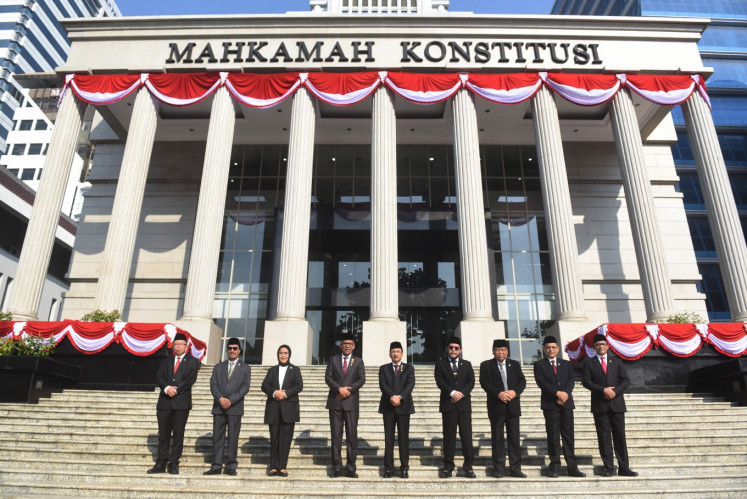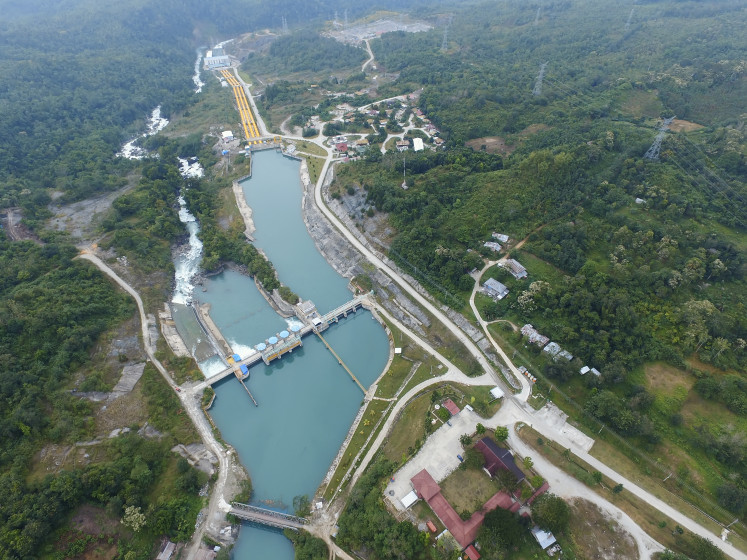Popular Reads
Top Results
Can't find what you're looking for?
View all search resultsPopular Reads
Top Results
Can't find what you're looking for?
View all search resultsThe new newswire: A Dutch student called Michael
I've written about Twitter before in these pages, but I make only a mild apology for writing about it again
Change text size
Gift Premium Articles
to Anyone

I've written about Twitter before in these pages, but I make only a mild apology for writing about it again. Twitter, in case you missed it the first time around, is an online service that lets anyone -- you, me, companies, organizations, the Queen -- send short SMS-like messages to a web page that can be viewed by others who "subscribe" to your updates.
Twitter has come a long way since it was launched. Although I must confess I don't use it as much as I used to (I have more real world friends on Facebook, so prefer to see what they're up to there), it has taken on a life of its own in places like the U.S. and Europe, where hundreds of thousands of Twitterers share their thoughts, activities, or links to websites in messages called "tweets".
Most interesting, perhaps, it's become a sort of wire service for news; the BBC and other news sites have "feeds" that allow you to monitor news mashed in with all your other Twitter alerts (it makes for confusing reading: "Genocide in Darfur tops U.N. agenda" followed by "Think I'll eat whatever isn't actually moving in my fridge").
But what's interesting is the emergence of Twitter as a news service in its own right. ReadWrite Web, an excellent website dedicated to Web 2.0 stuff, points out that the recent earthquake in England -- not that unusual in itself, apparently, but rarely actually strong enough to be felt by humans -- was reported first by Twitterers and by a Twitter-only news service called BreakingNewsOn (www.twitter.com/BreakingNewsOn).
ReadWrite Web wrote: This story broke over Twitter in the past half hour, and nothing is up yet on the BBC sites, the Guardian, or the Telegraph. This story is breaking live on Twitter.
Looking at the situation a few hours later, it was evident that mainstream websites had been a bit slow with the story. From what I could gather, the timeline was something like this (all times are in GMT):
=========================================================
Quake hits south of Grimsby: 00:56
First "tweets" 00:57
BreakingNewsOn 00:59 ("Unconfirmed reports of earthquake in London")
BreakingNewsOn 01:01 ("Reports of earthquake, working to confirm", followed by lots of "tweets")
BreakingNewsOn 01:10 (confirmation from European-Mediterranean Seismological Center)
Dow Jones Newswires 01:29 (quotes BBC report)
Associated Press 01:30 (garbled alert)
Reuters 01:36 ("Quake shakes Britain, no casualties reported")
AFP 01:45 ("Moderate quake shakes Britain")
BBC twitter feed 01:56 ("Tremors felt across England")
=========================================================
There may be some holes in here: I don't have the exact time when the BBC website first carried the story, but I'm guessing it was a few minutes before the wires. And this is not the first time BreakingNewsOn has been ahead: It was, according to some reports, first to report the Benazir Bhutto assassination, although I've not been able to confirm that.
So who or what is BreakingNewsOn, and how does it scoop the big guys on their own turf?
The service is actually pretty much one guy; a 20-year-old Dutch student called Michael van Poppel. He's a news junkie, and makes money from it too, doing something called web-trawling-searching the net for stuff he can sell to the big players (he was the guy who last September dug up a videotape of Osama bin Laden, which he then sold to Reuters).
Van Poppel works with a couple of other people and is clearly experienced and voracious in hoovering up web content.
But it's also about citizen journalism and crowd sourcing. Whatever you want to call it, in the case of the UK quake the first alerts actually came from witnesses, who twittered about the jolts they felt; it was BreakingNewsOn's skill in harvesting that information and staying sufficiently close to its readers for them to think to share their experience, that led to the fast turnaround.
Of course, there's much about this that is new. Everyone is now a reporter, if they find themselves in the middle of news. And everyone can be a media publisher: In this case it's one 20-year-old student with a twitter feed and an Internet-connected computer.
And, finally, everyone can now subscribe to that once holiest-of-holies; a newswire service that updates in real time. Only now it's not called a Reuters terminal or a Bloomberg, but Twitter.
But beyond that, not much has changed. I've covered a few quakes in my time, and it's all about finding the stuff out quickly and getting it out quickly. Nothing much has changed. No one was injured or killed, and it sounds like there was no falling masonry or damage to buildings. But that's no excuse. Earthquakes are news, and especially if they're the strongest in the country for two decades.
Twitter is perfectly suited for breaking news, because it's all about short pithy sentences and updates.
As ReadWrite Web points out, during the California wildfires last year, Twitter and other citizen journalism tools were used by people on the ground, scooping the mainstream press. And all this offers some lessons for the mainstream press that it would be wise to absorb:
* Mainstream media cannot afford to be slow off the mark on stories like this, since their value to high-paying subscribers is intimately tied to their speed;
* Alert streams are no longer the province of market traders;
* Traditional media needs to find a way to work with these new sources of news, or else find a way to add value that such services cannot;
* Traditional media has to both monitor these new sources of news -- the "tweets" from ordinary folk surprised to be shaken awake by a tremor -- and work with them to ensure that they, too, benefit.
Some might say that what van Poppel does isn't news. I'd contest that. He did everything right in reporting the story: it's big enough an event to merit an "unconfirmed" snap, a quick follow-up which contains what we old newshounds would call an advisory letting subscribers know what he's doing and to expect more.
When he got confirmation he put it out; all this within 10 minutes. That's a time-tested, old-fashioned and reasonable news approach. He leveraged the new media, but he showed an understanding of news values and what his readers needed.
Kudos to him. We all could learn a lesson.
Jeremy Wagstaff writes for The Wall Street Journal Asia and the BBC World Service. His guide to technology, "Loose Wire", is available in bookshops or on Amazon. He can be found online at jeremywagstaff.com or via email at jeremy@loose-wire.com.









